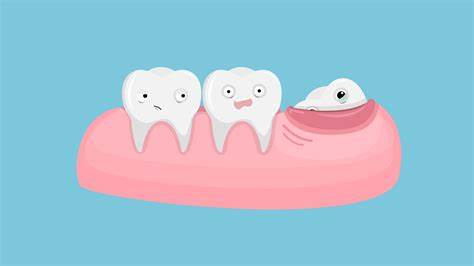What is wisdom teeth and what should I do if I get some

Wisdom teeth are the last post-eating caries, usually in the early teens or in their twenties. Usually there are two wisdom teeth on the upper jaw and two on the lower jaw. Wisdom teeth can cause a variety of dental problems. Sometimes it is recommended to remove the wisdom teeth with problems and pain.
Wisdom teeth common problem
Wisdom tooth infection - In some cases, the jaw may not have enough space to accommodate wisdom teeth. This can make brushing and flossing these teeth very difficult. Food and bacteria can accumulate between the wisdom tooth and the adjacent molars, so there is a greater likelihood of decay and gum infection.
Symptoms of infection caused by wisdom teeth include:
- Red swollen chewing gum next to wisdom teeth
- Swollen
- pain
- fever
- Chees secreted by chewing gum
- Submandibular lymphatic pain
- Difficulty swallowing or opening your mouth
The infection caused by wisdom teeth can be treated, but if you do not remove the wisdom teeth, the infection will continue to recur. People with previous health problems and low immunity may experience serious complications from these infections. If you think you may be infected with wisdom teeth, please consult the Royal Melbourne Dental Hospital or your nearest community dental clinic.
Cheek biting and chewing problems - Intensive wisdom teeth can rub the cheeks, causing cheek ulcers and chewing problems. A jam-hatch is a wisdom tooth that ejects at an angle and pushes into the next tooth (hard plug) or gum (soft plug). The wisdom tooth is at an angle that is not conducive to chewing, making it useless and potentially painful.
Wisdom tooth extraction, in the place where it is needed, it is best to do it morning and evening. With X-rays, your dentist can determine which wisdom teeth need to be removed. Sometimes a person may need to unplug all the wisdom teeth. Depending on the complexity of the problem, the procedure can be performed on an operating chair using a local anesthetic or in an operating room using a general anesthetic.
Your jaw and gums may be painful, swollen, and prone to bleeding within a few days after surgery. One possible postoperative complication is a dry socket where the site does not heal as well as it should. Your dentist can successfully treat this.
Oral care after tooth extraction
Your dentist or oral health professional will provide postoperative oral care instructions, but general recommendations for self-care after tooth extraction include:
- If necessary, take painkillers as recommended by a dentist or other oral health professional.
- Drink a regular warm water (after meals only) and drink under the guidance. Be sure to wait 24 hours after the operation.
- Eat soft, chewy food in the next few days.
YOU MAY ALSO LIKE






